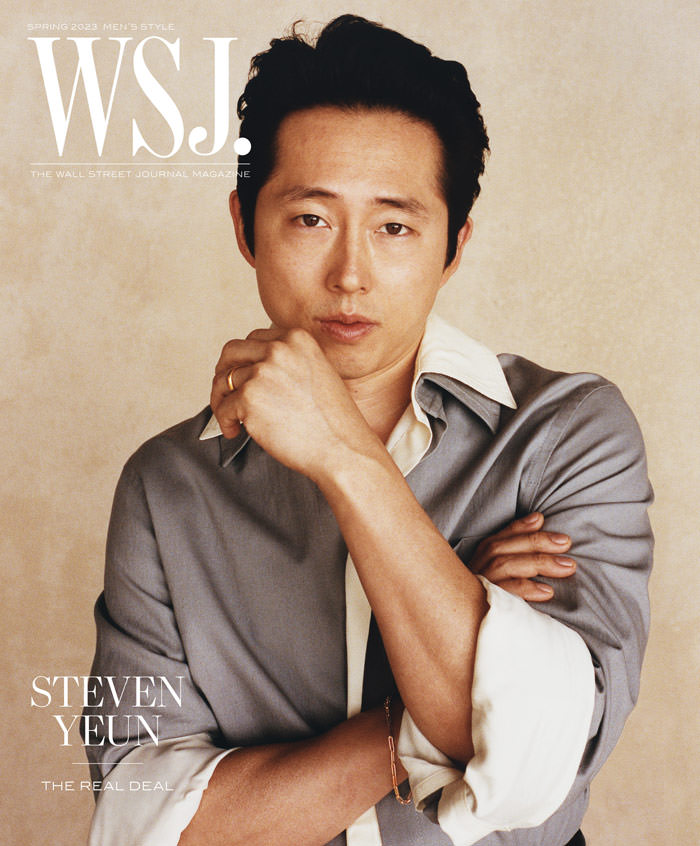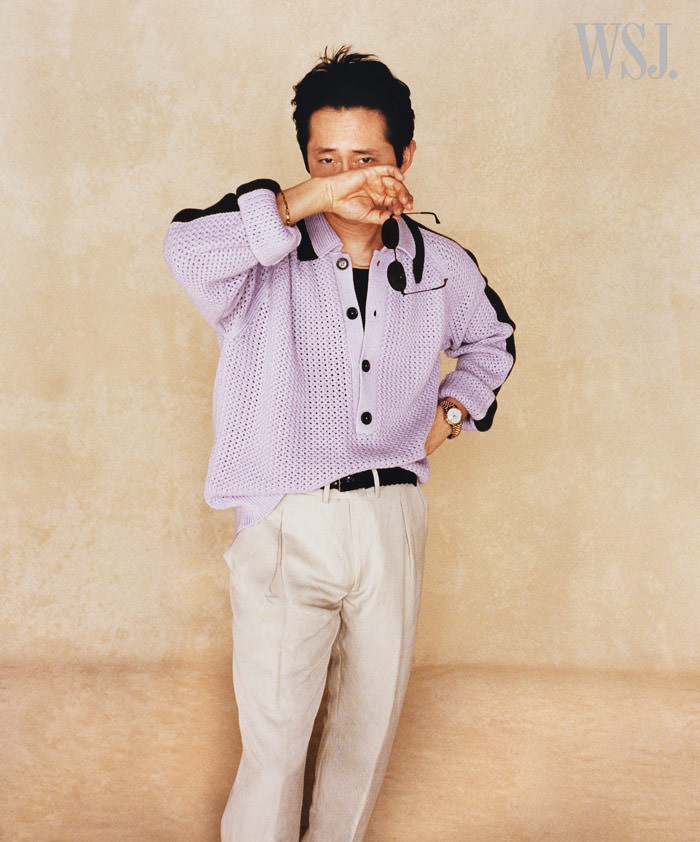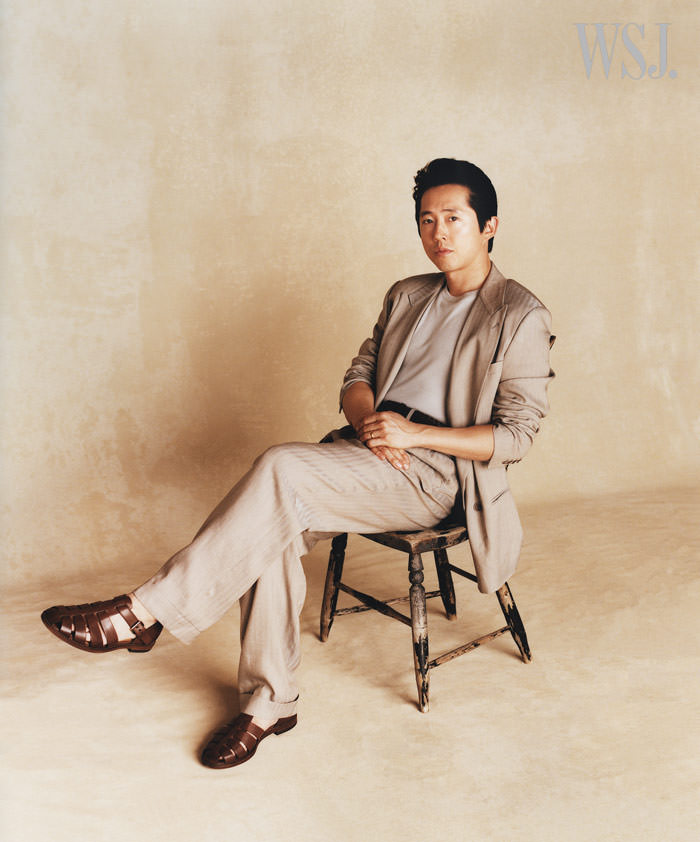
Actor/producer Steven Yeun, who made big news this week when Marvel announced his addition to the MCU with the upcoming THUNDERBOLTS, covers WSJ. MAGAZINE’s Spring Men’s Fashion Issue, sporting the best of spring menswear’s luxuriously laid-back styles by Armani, Ralph Lauren, and more. Cover and inside images photographed by Yoshiyuki Matsumura, styled by Edward Bowleg III.
In a candid, wide-ranging interview for the feature, written by Jonah Weiner, the Oscar nominee and Walking Dead fan favorite discusses his highly anticipated Netflix show BEEF, a dark comedy with Ali Wong premiering in April, created by Lee Sung Jin, and waxes philosophical on everything from his spiritual quest to racial identity to his past drug use and his WALKING DEAD co-stars.


Yeun on his life as a father: “My entire life is Peppa Pig and Pokémon,”
Lee Sung Jin on Yeun’s character in Beef: “He has to be this self-destructive, burdened guy with a huge chip on his shoulder—and you have to root for him, and he has to be funny.”
Yeun on the work he’s drawn to: “I love that feeling of, ‘Oh, I had no idea it was this until I got there. I’d hate to do a project where I have a road map for where it’s supposed to go. That doesn’t sound like fun.” “I really don’t like feeling boxed in,” Yeun says now. “I don’t like feeling trapped.”
Yeun on Beef’s dark humor: “I wasn’t aware until Ali told me, ‘I was laughing at that.’ I was, like, ‘You were laughing? It’s a deeply moving scene!’ ” Yeun smiles. “It’s inherently funny to watch someone try not to cry, then give into it, but it took me a second to step back and see the duality in it.”
Yeun on his parent’s wish that he become a doctor: “I was dog shit at science,” he says. “Horrible!” But he loved comedy. “I don’t know if I’d call myself a comedian, but I could tell a funny story, and I knew what was funny. I watched Pryor, Chris Rock, early Dave Chappelle, old Mitch Hedberg, Steve Martin, Adam Sandler, all the greats,” he says. One day on campus, “I saw an improv troupe and said, ‘That looks fun,’ so I jumped in.”
Yeun on his comedic skills: “My skill was never wit,” he recalls. “I always envied those guys. There were a couple heavies I remember, where they were always on. Bam- bam-bam, hitting the joke. I couldn’t do that. But what I could do was really commit to the scene, and play the part as real as possible. Nothing’s funnier than real life.” He grins. “Real life is f—ing hilarious.”
Yeun on his relationship with his Walking Dead co-stars: “I just saw Andy, I talk to Jon, I talk to Norman. Norman’s the shit.” But while making The Walking Dead, he began to chafe at what he sometimes saw as his character’s limited dimensionality. “I felt like I was servicing a concept of goodness,” he has said, “as opposed to engaging with Glenn’s humanity.”
Yeun on his spiritual quest: “I didn’t like being ostracized or objectified or isolated in that way, in a place that’s not about being isolated.” What ensued was a program of personal searching that hasn’t stopped since. “I can touch parts of Christianity that make sense to me,” Yeun says. “I can touch parts of Buddhism; I can touch Nietzsche. I’m not looking for a defined space of spirituality. I’m just trying to make sense of it, however it makes sense.”
Yeun on his past drug use: “I came to a lot of things late,” he explains, and as a result, “I went a little ham with that stuff, trying to make up for lost time.” That was before he had kids, but he remains curious about psychedelics: “It’s becoming standard to do DMT or lick a toad. I haven’t done that, but I’d like to, at some point.”
Yeun on using drugs to quiet his mind and his tendency to overthink, which he believes is both his curse and his superpower: “For me, it was the slowing down of my mind that was really effective and necessary, It’s the way I’ve been since I was 4, when I got dropped here and my brain went into a hyperdrive of self-defense,” Yeun says. “I can obsess over something. I can be taken down by thoughts.”
Yeun on his cultural identity: “When I was growing up, I was more messed up by the thoughts of others,” he tells me. “ ‘What does that person think I am?’ Then the tension becomes, ‘I need to show people I’m not that,’ but then you’re working against an ideal you created yourself—it’s not a fun place to exist.” And yet, he says, “I was pretty clear about who I was, to myself, from a really early age, and so life had been me mostly trying to explain myself.” In those interviews, “I was trying to make it so that I could stop explaining myself.”
“Culture is great, it’s beautiful, but that’s not the depth of who we are,” Yeun says. His hope with the show is that, no matter who you are, “You’re able to see it and say, ‘Oh, that’s me. I’m not part of that culture, but that’s me.’” He thinks about it for a second. “Isn’t that the ultimate goal for any outsider group? To say, ‘Oh, you relate to me; we’re the same.’”
[Photo Credit: Yoshiyuki Matsumura for WSJ. Magazine]
CREED III Los Angeles Premiere Red Carpet Rundown Next Post:
EVERYTHING EVERYWHERE ALL AT ONCE Star Michelle Yeoh at THE LATE SHOW WITH STEPHEN COLBERT
Please review our Community Guidelines before posting a comment. Thank you!



